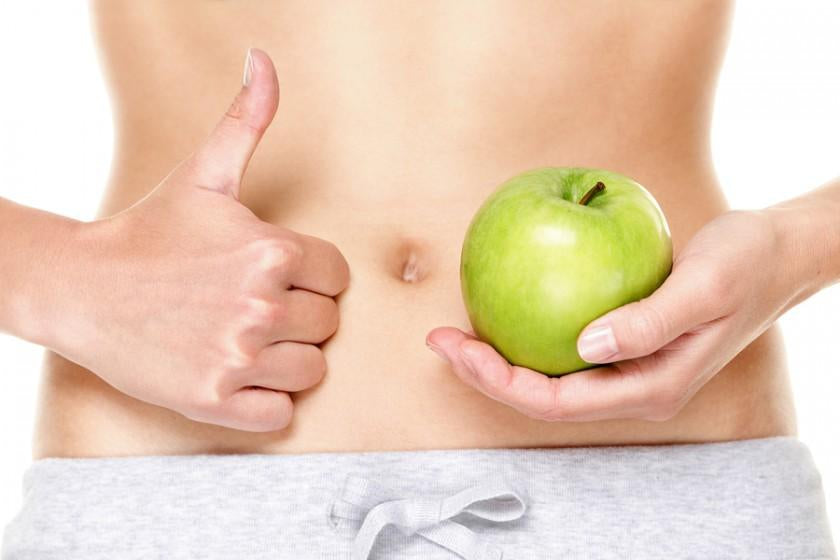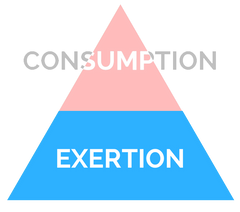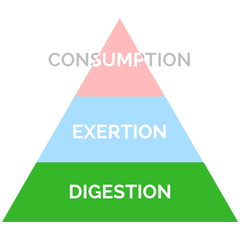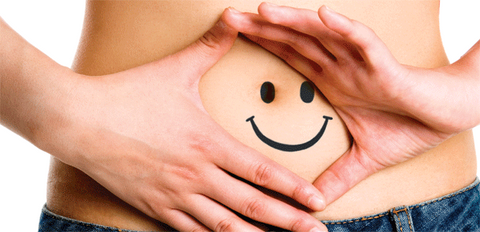Gut Health and Weight Loss: Why Good Gut Bacteria Matters

Sometimes, losing weight can feel like an uphill battle. You’re constantly bombarded with ‘solutions’ for how to shed pounds – but many of these involve spending a lot of money on special products or programs. Worst of all, the claims made by these programs are often unsubstantiated and only provide short-term results.
For a long time, we’ve been led to believe that weight loss is a matter of only two things: calories in and calories out. What none of the big-name marketing companies tell you is that there’s another step.
Long-term weight loss can only happen when your lifestyle supports good gut health. That is, when all the body’s systems are in balance.
To burn calories, your GUT has to be functioning properly. Everything that goes into your mouth has to be processed by the gut. As a result, the gut plays a leading role in how well your metabolism works.
The formula is actually very simple: Consumption + Digestion + Energy Expenditure = Weight Loss or Weight Gain
Let’s see how this works.
Step 1: Consumption (Calories In!)


In short, a good diet is about supplying your body with nutrients in a way that helps your body function properly and maintain a healthy weight.
How Calories Affect Weight Loss
All food contains an energy value which is measured in calories. The number of calories in a food item represents how much energy it will provide our body with. Energy is essential for the body to perform physical tasks and maintain normal regulatory functions such as respiration, digestion and metabolism.
A small calorie = 1cal. This is the amount of energy required to raise one gram of water by one degree Celsius. Energy can also be expressed in kilojoules: one calorie is equal to 4.184 kilojoules.
Foods contain different amounts of calories according to their composition. For example:
- 1g of carbohydrates contains 4 calories
- 1g of protein contains 4 calories
- 1g of fat contains 9 calories
Everyone’s daily requirement for calories differs according to their level of activity, age, gender, health conditions and other factors. The USDA estimates that most women need 1,600 to 2,400 calories to maintain a healthy weight, whilst men need 2,000 to 3,000 calories each day.
Diet Barriers to Weight Loss
Cravings: No matter how good your intentions, you find yourself craving the sweetness of a chocolate biscuit, or the saltiness of potato chips. And even when you tell yourself you’ll only have one, the whole packet is suddenly demolished! These cravings can come on at any time, but they most often occur around mid-afternoon, or late at night.
Confusion: You’ve scoured the internet for diet tips and read loads of diet books, but you’re more confused than ever. Should you cut out carbs or cut out fat? Are fruits and vegetables good for you or do they contain too many calories? Will ‘diet products’ help you to lose weight or not?
Boredom: After a week (or a day!) of eating fruit and vegetables, you may feel pleased with yourself for being ‘good’ – but if you don’t enjoy these foods, you’re going to get bored.
Satiety: You’ve eaten a huge salad with lots of leafy greens, which you know is good for you. But you’re still hungry! Or worse, you feel bloated – but still unsatisfied.
Step 2: Exertion and Exercise (Calories Out!)

Exercise isn’t the only way to burn calories – your body actually needs a certain number of calories each day to function properly. This amount depends on factors such as age or gender. A moderate level of activity requires around 1800 – 2200 calories just to fuel functions such as metabolism, respiration and digestion.
Your basal metabolic rate (BMR) accounts for the majority of total calories you burn each day while at rest. A simpler way of defining metabolic rate is the minimum amount of energy required to keep your body functioning: or, how many calories you would burn if you were to do nothing but rest. Functions such as ventilation, blood circulation and temperature regulation all require energy. Amazingly, calories are also required for digestion and absorption of food.

Incredibly, your metabolic rate burns nearly two-thirds of your caloric intake! Only 15-30% of our calorie burn is due to physical activity. Even more incredible is the fact that digestive processes comprise around 10% of energy expenditure.
How Energy Expenditure Affects Weight Loss
Generally speaking, the more active you are, the more energy your body requires. The less active, the less energy you require. This is where weight gain and weight loss come into the picture:
– If amount of energy consumed is equal to the amount of energy spent, then weight remains same.
– If amount of energy consumed is less than amount of energy spent, it results in weight loss.
– If amount of energy consumed is more than amount of energy spent, it results in weight gain.
Every calorie you eat has the potential to be used as energy. To maintain weight, calorie intake must match energy expenditure. Eating fewer calories than required for energy expenditure forces the body to use its stored energy for fuel. This leads to fat being burned and eventual weight loss.
Exercise Barriers to Weight Loss
Time: Life is busy – and sometimes it may seem you don’t have time to exercise. Juggling a job, family, school, and a hundred other commitments leaves very little time to hit the gym or pound pavement.
Energy: Sometimes you simply have no energy to exercise. Bizarrely, this can happen even when you know you’ve eaten more calories than you’ve burned!
Ability: Stiff muscles, sore joints or lack of fitness can be huge barriers to exercise. Some people may even use their ‘injury’ as an excuse not to get some exercise.
The Step Between Diet and Exercise: Digestion! (AKA Gut Health and Weight Loss)

For the calories you eat to be used as energy, one very important thing has to happen first: digestion. The food containing those calories has to be broken down in the gut and turned into fuel.
Healthy digestion requires a healthy balance of gastrointestinal microbiota (gut bacteria).
Gut microbiota are the bacteria that live naturally in the digestive tract. They help the body to break down food, absorb nutrients, counteract bad gut bacteria and establish the ‘good’ bacteria needed for healthy digestion, immune support and overall wellbeing. The average human body contains over 1.5kg of probiotic bacteria and organisms.
How Your Gut Bacteria Influences Your Weight Loss
Poor Gut Bacteria Prevents Weight Loss
Research has shown that those who are overweight or obese also have something else in common – poor gut bacteria. In fact, the microbiota profile of obese people differs significantly from those who are slim.[1]
It’s believed that these imbalances contribute to the risk of someone becoming obese or being able to lose weight. The more bad bacteria in the gut, the harder it is to shed pounds. This is likely because a typical Western diet is high in saturated fat and refined sugar, and also tends to be low in fiber. These foods are the main causes of poor gut bacteria and dysbiosis.
Conversely, it’s been found that a healthy diet and consumption of probiotics had a positive effect on gut microbiota, and, subsequently, weight loss.
Probiotics For Gut Health and Healthy Metabolism
Studies on mice shown that gut bacteria play a key role in the way the body metabolises bile acids. Bile acids are made by the liver in order to break down fats that enter the stomach. When treated with certain strains of probiotics, the mice in this study were better able to produce bile acids and therefore metabolised fat faster.[2]

Gut dysbiosis such as Candida overgrowth affects hormone production, causing the thyroid to become sluggish and, in turn, slowing down the metabolism.
Researchers suggest that humans may be able to alter the efficiency of their metabolism by consuming Lactobacillus strains of probiotics or foods that promote good gut bacteria.
Gut Bacteria Influences Your Appetite
Cravings for sugar and carbohydrates are one of the main signs of poor gut microbiota, particularly in the case of Candida overgrowth. A number of studies have now shown that an imbalance of bad bacteria contributes to cravings and psychological conflict in terms of choosing what to eat on a daily basis.[3] It’s known that our self-control is largely affected by signs from microbiota in the gut, and that our cravings for certain foods stems from these bacteria.
Gut Bacteria Influence Your Willpower
Digestive discomfort caused by an imbalance of gut bacteria or poor digestion can be both caused by and contribute to low mood. This is because there is a direct line of communication exists between the brain and our enteric nervous system lining the intestinal tract, which carries messages between the gut and the brain.
The gut-brain axis plays a major role in your emotions, which in turn influences your desire to exercise, binge, lose weight or simply think rationally about foods.
Candida overgrowth is also known to cause cravings for sugar and carbohydrates, as well as low mood and energy. We all know that low mood can lead to ‘comfort eating’ and reduce willpower to when it comes to turning down ‘bad’ food, further compromising weight loss.
Gut Bacteria Affects Your Feelings of Satiety
Certain types of bacteria have been shown to play a part in how hungry or full you are. These bacteria can modulate the levels of ‘hunger-stimulating’ hormones in the body, otherwise known

as ghrelin. When you eat a lot of high fat foods, the bacteria in your gut produce more acetate, which leads to the pancreas producing more insulin.
Studies in rats have shown that higher levels of acetate results in the rodents eating more and becoming obese.[4] The rats also developed insulin resistance, which is the precursor to diet-induced diabetes.
Gut Bacteria Contributes to Toxic Overload
A healthy bowel transit time is essential for the elimination of toxins from the body. Bowel transit time is how long it takes for food to pass through the body – which has an important effect on how well nutrients can be absorbed from the food you eat before it is passed out as ‘waste’.
A bowel transit time that is too slow will lead to gas and fermentation, causing toxins to build up in the gut. When this happens, the liver becomes overburdened and cannot metabolise fats as efficiently. This can result in dietary fats being stored rather than used as fuel. A build-up of toxins also contributes to low energy and a weakened immune system.[5]
Summary: Probiotics for Gut Health Means Healthy Weight Loss

Sustained weight lossis not just about calories in, calories out – it’s about maintaining the health of the gut.
Research has proven that vital link exists between gut bacteria and its influence on the types of food you crave, how satisfied you feel after eating, and how well your body is able to break down food and turn it into fuel that your body burns as energy.
An imbalance of gut bacteria not only results in cravings for ‘bad’ foods, but in poor digestion, hormonal imbalance, and a higher chance of calories being stored as fat – all the ingredients of weight gain.
Healthy gut microbiota is the essential ‘middleman’ in weight loss. Eating the right foods and going to the gym will only get you halfway there: long-term weight loss can only happen when the gut is functioning properly as well.
Here's the good news: Maintaining a healthy gut is as easy as adding probiotics to your daily diet.
Using tested weight loss probiotics from recent clinical studies, we at Better Body Co. have formulated a 3-strain probiotic supplement called Provitalize. Our users have reported to lose as much as 5 pounds within a week, even without any major change in their diet or lifestyle.
It’s the simplest and most effective way to successful weight loss!

